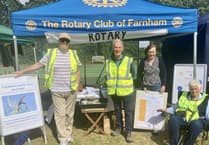TWO men, who had last been together as child prisoners in a Nazi concentration camp during the war, met again on stage last week at Bedales Olivier Theatre.
Paul Sandfort and Eugene Schwartz had both performed at the camp in the children's opera, Brundibar. They were both in Steep to see a double bill of the opera and a play, Fire Across the Night, performed by Dunhurst School.
It was an evening which left the audience with mixed feelings of anger, sadness and wonder at the resilience of the human spirit.
The children's opera was written by the Czech composer Hans Krasa and performed 55 times in Terezin.
This was called "a city for the Jews" by the Nazis but in reality was a concentration camp with many children among its occupants.
One of those sent to Terezin was a Dane, Paul Sandfort. His life and experiences formed the basis for the character of Paul in the play.
When Dunhurst English master Simon Kingsley-Pallant began writing Fire Across the Night he believed Paul and all the other children had probably been sent to Auschwitz and died in the gas chambers. Hans Krasa certainly had died there in 1944.
But miraculously Paul Sandfort was still alive and living in Copenhagen. Eugene Schwartz, by extraordinary coincidence grandfather of two of the Dunhurst performers, had survived as well and was living in America.
It was difficult for members of the audience to come to terms with the play showing what life must have been like for the children in Terezin and how the opera provided relief from endlessly facing an unknown future. What must it have been like for Paul Sandfort, who acted as adviser for the production and the young cast and was in the audience for the opening night?
What was it like to see the opera again and remember his childhood friends, almost all of them dead?
He said it did bring back memories but most of all when he saw the opera it was as if all the children who had performed Brundibar in Terezin had come back to life again for those precious moments.
Before the play Mr Sandfort spoke briefly to the audience of his memories of the war and the yellow stars which the Nazis had forced all Jews to wear.
He produced his own star and said that for a long time he had not been able to look at it. He thanked Dunhurst for performing the play and especially the opera which had meant such a lot to him as a child.
Brundibar is a charming short opera telling the tale of how two children obtain money to buy milk for their sick mother in spite of the barrel organ player, Brundibar's, attempts to thwart them.
The audience rose to their feet applauding at the triumphant end of the opera but the play was not over. The Nazi guards returned, the train arrived and the children were herded on to it. Only Paul was left grieving for his friends. It was a moment of intense desolation.
At the end of the performance Mr Sandfort simply hugged James Buck, who had played Paul, and said "Thank you".
The audience was left with a mixture of feelings - anger that such suffering could have happened, sadness that so many young lives had been destroyed and wonder that the human spirit does survive.



